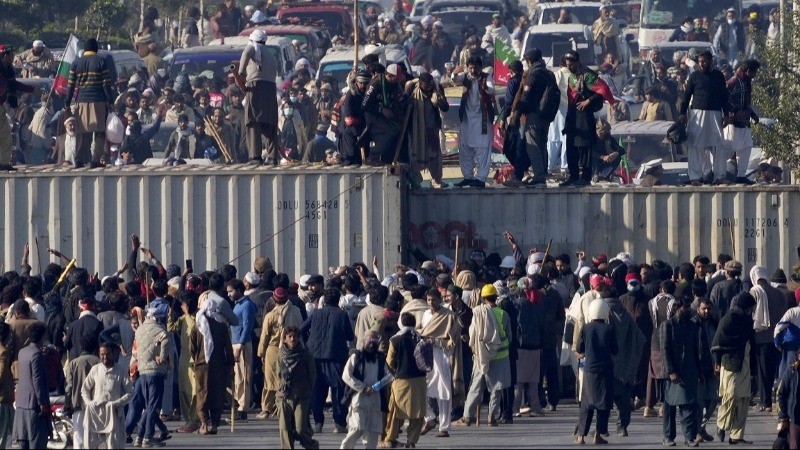
Violence erupted in Pakistan on Tuesday, resulting in the deaths of six security personnel and over 100 injuries, after protests by supporters of jailed former Prime Minister Imran Khan turned deadly. The federal government deployed the army to Islamabad, issuing shoot-at-sight orders as the situation escalated. The protests, organized by Khan's Pakistan Tehreek-e-Insaf (PTI) party, were aimed at pressuring the government for his release and other political demands.
According to state media, four paramilitary Rangers and two police officers were killed during the unrest. On Monday night, a vehicle rammed into Pakistan Rangers personnel on the Srinagar Highway in Islamabad, killing four Rangers and injuring five others. Near Rawalpindi, armed protesters also clashed with security forces, throwing stones and opening fire. The clashes led to further injuries among police and Rangers officers.
The Punjab police reported one officer's death during confrontations at the Hakla interchange on the outskirts of Islamabad, although further details were scarce. Interior Minister Mohsin Naqvi confirmed that over 100 security personnel had been injured, including a senior police officer who suffered a severe head injury from stone-pelting by protesters.
In response to the violence, the Pakistani government ordered the army to take decisive action against "miscreants and troublemakers," with shoot-at-sight instructions issued to quell the unrest. Prime Minister Shehbaz Sharif condemned the attacks on security forces and vowed to bring those responsible to justice. He also emphasized that political violence, disguised as peaceful protest, would not be tolerated and that the government would provide medical care to those injured in the clashes.
The government had proposed an alternative protest location to Khan's supporters at Sangjani, a suburban area of the capital, which Khan initially agreed to. However, Naqvi suggested that other leaders within PTI were preventing the agreement from being finalized, and he warned that the party would not be allowed to protest at the D-Chowk area in central Islamabad. He also hinted that a curfew could be imposed if necessary to maintain order.
Security sources assured that all measures were being taken to combat extremist elements involved in the violence, and they stressed the importance of identifying and prosecuting those responsible for the attacks on security forces.
PTI leaders, however, accused the authorities of using excessive force, with some party members reporting that at least two of their supporters had been killed in the clashes. The violent protests have drawn international attention, as Khan, who has been in jail since August 2023, has called for protests to demand his release and the reversal of what he claims were rigged elections.
The PTI protests, which began in Khyber Pakhtunkhwa under the leadership of Chief Minister Ali Amin Gandapur and Khan's wife Bushra Bibi, faced heavy resistance from authorities. Police had blocked the roads leading to Islamabad with shipping containers, but protesters used heavy equipment to remove the barriers, albeit with delays.
Authorities imposed Section 144, a law restricting public gatherings, in a bid to curb the protests as a high-level delegation from Belarus visited Pakistan. The unrest also led to the closure of schools and educational institutions in Islamabad and Rawalpindi due to safety concerns.
Khan, the leader of PTI, has faced numerous legal challenges since his government was ousted in 2022. Currently imprisoned in Adiala Jail in Rawalpindi, he is facing over 200 cases. His party had won the most seats in the February 2024 elections, despite contesting as independents, as it was denied an official election symbol. Khan continues to allege that his party's victory was stolen by the ruling Pakistan Muslim League-Nawaz (PML-N) and its allies.
US Calls for Peaceful Protests and Respect for Human Rights in Pakistan
Thousands Arrested as Islamabad Locked Down Ahead of Imran Khan Rally
Why THESE Popular Bollywood Celebrities Can't Cast Their Votes in India